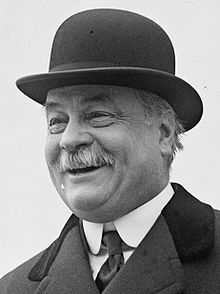Nicholas Murray Butler
Nicholas Murray Butler (born April 2, 1862 in Elizabeth , New Jersey , † December 7, 1947 in New York ) was an American philosopher and publicist . In 1931 he and Jane Addams received the Nobel Peace Prize for his commitment to the Briand-Kellogg Pact .
life and work
Education and university activity
Butler was born in Elizabeth, New Jersey, in 1862, the son of an industrialist. He studied at Columbia College in New York City and graduated with a thesis on Immanuel Kant . In 1884 he received his doctorate as a philosopher and in 1888 he was appointed professor of philosophy at Columbia College. In 1893 he also took over the professorship for education and in 1902 he became president of the college, which he restructured to Columbia University . It was not until 1945 at the age of 83 that he resigned as president of the university; his successor was Frank D. Fackenthal .
Peace work
Butler worked very early on in the peace movement and campaigned for international understanding. Although he was repeatedly offered political offices as governor, ambassador and even foreign minister of the United States, he turned them down. In 1907 he founded the American section of the Committee for the Defense of National Interests and International Reconciliation , founded by the French Paul Henri d'Estournelles de Constant . From 1907 to 1912 Butler took part in the preparations for the formation of the International Court of Arbitration in The Hague in 1921.
In 1910, American industrialist Andrew Carnegie made a $ 10 million donation available for the establishment of the Carnegie Foundation for International Peace , helped largely by Butler. This foundation was one of the most important financial pillars of international peace work in the following years. Butler became director of the foundation company in Washington, DC and from 1925 president of the same. In his role, he was a popular contact for the US presidents, who used him as an external advisor. Occasionally he also took on diplomatic functions, such as a meeting with the Soviet head of government Lenin and the Italian head of state Benito Mussolini . Butler was skeptical of the League of Nations founded after the First World War .
Butler supported the idea published by Aristide Briand in 1927 to outlaw war as a political tool and he promoted it in the USA. In this way he became one of the most important sponsors of the Briand-Kellogg Pact, concluded in 1928.
politics
As a member of the Republican Party , Butler was also politically active. Between 1888 and 1936 he attended every Republican National Convention as a delegate. When US Vice President James S. Sherman died eight days before the 1912 presidential election , in which he was to take part again alongside President William Howard Taft , Butler was nominated as a replacement by the Republican National Committee . However, he was not elected to the office of Vice President, as Taft could only win the states of Utah and Vermont , which he ended up only in third place behind Woodrow Wilson and Theodore Roosevelt .
In 1916 Butler campaigned for former Foreign Secretary Elihu Root to be nominated for the Republican presidential nomination , but the party chose Charles Evans Hughes . In the elections of 1920 and 1928 he ran himself as a presidential candidate, but was unsuccessful.
In 1909 he was elected a member of the American Academy of Arts and Letters and in 1938 of the American Philosophical Society .
literature
- Bernhard Kupfer: Lexicon of Nobel Prize Winners . Patmos Verlag, Düsseldorf 2001. ISBN 3-491-72451-1
Web links
- Information from the Nobel Foundation on the 1931 award ceremony for Nicholas Murray Butler
- Literature by and about Nicholas Murray Butler in the catalog of the German National Library
- Newspaper article about Nicholas Murray Butler in the 20th century press kit of the ZBW - Leibniz Information Center for Economics .
Individual evidence
- ^ Members: Nicholas Murray Butler. American Academy of Arts and Letters, accessed February 19, 2019 .
- ^ Member History: Nicholas Murray Butler. American Philosophical Society, accessed May 26, 2018 .
| personal data | |
|---|---|
| SURNAME | Butler, Nicholas Murray |
| BRIEF DESCRIPTION | American philosopher and publicist; Nobel Peace Prize Laureate in 1931 |
| DATE OF BIRTH | April 2, 1862 |
| PLACE OF BIRTH | Elizabeth , New Jersey |
| DATE OF DEATH | December 7, 1947 |
| Place of death | New York City |
